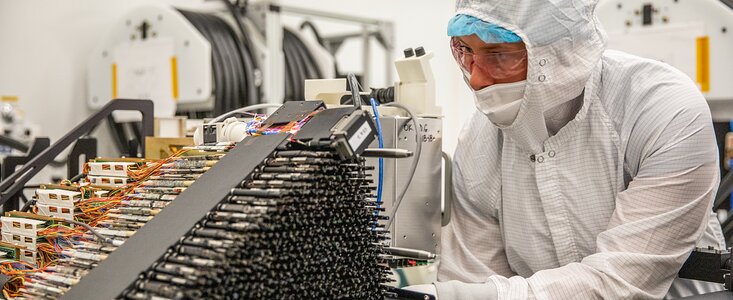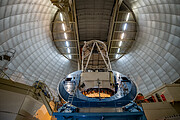Dark Energy Spectroscopic Instrument Passes Major Milestone
1 June 2020
The Dark Energy Spectroscopic Instrument (DESI) on the Nicholas U. Mayall telescope at Kitt Peak National Observatory (KPNO), a Program of NSF NOIRLab, has passed a major milestone en route to mapping tens of millions of galaxies in its quest to understand the nature of dark energy and its role in the expansion history of the Universe.
DESI was designed and built by an international collaboration of about 500 researchers at 75 institutions in 13 nations. DESI can observe up to 5000 galaxies at a time, using optical fibers that feed the light from each galaxy into an array of spectrographs. There the light is spread into individual rainbows which will enable the team to create a three-dimensional map of the Universe.
When it became clear in March that KPNO would be closed owing to COVID-19, the team moved quickly to obtain preliminary data, which enabled them to reach its final approval milestone: on 8 May 2020 the DESI project received final official approval to proceed from a federal Advisory Board. Planning is now under way for a limited restart of science operations at KPNO; the site remains closed at this time.
More information
NSF’s National Optical-Infrared Astronomy Research Laboratory (NOIRLab), the US center for ground-based optical-infrared astronomy, operates the international Gemini Observatory (a facility of NSF, NRC–Canada, ANID–Chile, MCTIC–Brazil, MINCyT–Argentina, and KASI–Republic of Korea), Kitt Peak National Observatory (KPNO), Cerro Tololo Inter-American Observatory (CTIO), the Community Science and Data Center (CSDC), and the Vera C. Rubin Observatory. It is managed by the Association of Universities for Research in Astronomy (AURA) under a cooperative agreement with NSF and is headquartered in Tucson, Arizona. The astronomical community is honored to have the opportunity to conduct astronomical research on Iolkam Du’ag (Kitt Peak) in Arizona, on Maunakea in Hawai‘’i, and on Cerro Tololo and Cerro Pachón in Chile. We recognize and acknowledge the very significant cultural role and reverence that these sites have to the Tohono O’odham Nation, to the Native Hawaiian community, and to the local communities in Chile, respectively.
Acknowledgements
DESI is supported by the U.S. Department of Energy’s Office of Science; the U.S. National Science Foundation, Division of Astronomical Sciences under contract to the NSF’s National Optical-Infrared Astronomy Research Laboratory; the Science and Technologies Facilities Council of the United Kingdom; the Gordon and Betty Moore Foundation; the Heising-Simons Foundation; the French Alternative Energies and Atomic Energy Commission (CEA); the National Council of Science and Technology of Mexico; the Ministry of Science, Innovation, and Universities of Spain; and DESI member institutions. The DESI scientists are honored to be permitted to conduct astronomical research on Iolkam Du’ag (Kitt Peak), a mountain with particular significance to the Tohono O’odham Nation. View the full list of DESI collaborating institutions, and learn more about DESI here: www.desi.lbl.gov.
Founded in 1931 on the belief that the biggest scientific challenges are best addressed by teams, Lawrence Berkeley National Laboratory and its scientists have been recognized with 13 Nobel Prizes. Today, Berkeley Lab researchers develop sustainable energy and environmental solutions, create useful new materials, advance the frontiers of computing, and probe the mysteries of life, matter, and the universe. Scientists from around the world rely on the Lab’s facilities for their own discovery science. Berkeley Lab is a multiprogram national laboratory, managed by the University of California for the U.S. Department of Energy’s Office of Science.
DOE’s Office of Science is the single largest supporter of basic research in the physical sciences in the United States, and is working to address some of the most pressing challenges of our time. For more information, please visit science.energy.gov.
The National Science Foundation’s NOIRLab, the U.S. center for ground-based optical-infrared astronomy, operates multiple research facilities including Kitt Peak National Observatory (KPNO), a Program of NSF NOIRLab. The Laboratory is operated by the Association of Universities for Research in Astronomy (AURA) under a cooperative agreement with NSF’s Division of Astronomical Sciences.
The National Science Foundation (NSF) is an independent federal agency created by Congress in 1950 to promote the progress of science. NSF supports basic research and people to create knowledge that transforms the future.
The Heising-Simons Foundation is a family foundation based in Los Altos, California. The Foundation works with its many partners to advance sustainable solutions in climate and clean energy, enable groundbreaking research in science, enhance the education of our youngest learners, and support human rights for all people.
The Gordon and Betty Moore Foundation, established in 2000, seeks to advance environmental conservation, patient care and scientific research. The Foundation’s Science Program aims to make a significant impact on the development of provocative, transformative scientific research, and increase knowledge in emerging fields.
The Science and Technology Facilities Council is part of UK Research and Innovation – the United Kingdom body which works in partnership with universities, research organizations, businesses, charities, and government to create the best possible environment for research and innovation to flourish. STFC funds and supports research in particle and nuclear physics, astronomy, gravitational research and astrophysics, and space science and also operates a network of five national laboratories as well as supporting U.K. research at a number of international research facilities including CERN, FERMILAB and the ESO telescopes in Chile. STFC is keeping the U.K. at the forefront of international science and has a broad science portfolio and works with the academic and industrial communities to share its expertise.
Established in 1958 and aiming at the forefront of astronomical science, the National Astronomical Observatories of the Chinese Academy of Sciences (NAOC) conducts cutting-edge astronomical studies, operates major national facilities and develops state-of the-art technological innovations.
Links
- Press release from Berkeley Labs
- DESI’s 5000 Eyes Open as Kitt Peak Telescope Prepares to Map Space and Time
Contacts
Amanda Kocz
Press and Internal Communications Officer
NSF NOIRLab
Cell: +1 520 318 8591
Email: akocz@aura-astronomy.org



